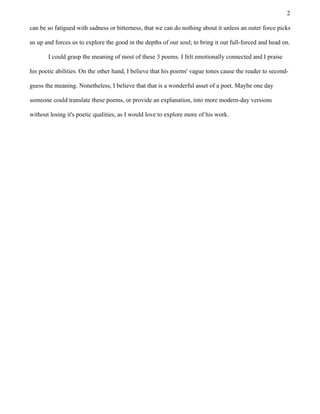Response essay sept 2010
- 1. 1 Edwin Rivera Dr. Sampson ENGL 111-19N Response Essay 09/24/2010 Response Essay on the Michelangelo Poems The poems by Michelangelo, Sonnet 60, 149, and Madrigal 150 struck me as illustrative and emotionally invested upon. The words with which he used in his poems were descriptive, yet questionable. They implied a sense of a wishful desire on his part, but what do the poems really imply? I felt as if it could represent different lusts and desires all at the same time. In sonnet 60 he longed life to resemble that of a phoenix, who burns at death and is re-born from the ashes. I'm sure everyone at one point also longs for eternal life. We are all curious and somewhat fear death (at the assumption of no after-life). It's as if he realized death is imminent and that he is ŌĆ£almost numbered with the dead alreadyŌĆØ(Sonnet 60). At the same time, the vague tone implies that the, what seems to me as a death lamentation, isn't so lamenting, but just a wishful thought. Sonnet 149 seemed the most confusing to me. The first four lines seemed to be the only lines which directly made sense, stating that the intellect of an artist can transform a simple block of marble into a genuine masterpiece. How does this relate to the rest of the poem? He is obviously stating some sort of affection towards someone in the poem. I feel as if he is stating that his past mistakes could interfere with the transferring of that affection toward that someone. In that case, I'm sure this poem could relate to very many others, including myself. Contrary, parts of this poem and some of his others can be very confusing, as if there is some hidden implication or is directly connected to another one of his poems. Maybe only Michelangelo himself knew the true meaning of this poem. I feel absolutely and emotionally connected with Madrigal 150. The words with which he uses to describe his feelings, which reminds me of the phrase, ŌĆ£No man is his own heroŌĆØ, is almost perfectly put. Michelangelo explains that the good of one's soul can be hidden in ŌĆ£its own body's surplus. . . which you alone can pull. . . in me there is for me no will or forceŌĆØ(Madrigal 150). Sometimes, we all
- 2. 2 can be so fatigued with sadness or bitterness, that we can do nothing about it unless an outer force picks us up and forces us to explore the good in the depths of our soul; to bring it out full-forced and head on. I could grasp the meaning of most of these 3 poems. I felt emotionally connected and I praise his poetic abilities. On the other hand, I believe that his poems' vague tones cause the reader to second- guess the meaning. Nonetheless, I believe that that is a wonderful asset of a poet. Maybe one day someone could translate these poems, or provide an explanation, into more modern-day versions without losing it's poetic qualities, as I would love to explore more of his work.


